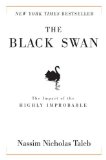The Black Swan by Nassim Nicholas Taleb

The Black Swan by Nassim Nicholas TalebNassim Taleb's The Black Swan is a fantastic, eye-opening book that will challenge not only what you know but also what you think you know. Taleb is widely renowned as the guy who made beaucoup amounts of money off of the 1987 stock market crash. He profited not by predicting the crash would happen, but that the system would eventually produce a "black swan" event that would make options insanely profitable.
Recommendation — Nassim Nicholas Taleb (or "NNT" as I like to refer to him) opened my eyes with this book. Any book that can blow open your understanding of the world is a must-read — and this is one of those books. The role that randomness and unpredictability play in our lives is completely under-appreciated, when it is acknowledged at all. Just one attempt at appreciation I've made can be found in my post "But For," which is an attempt to string together a series of unplanned events that have cumulatively had an enormous impact on my life.
Going forward, I want to garner a greater appreciation for power law, stochasticity, black swan events, and living in "Extremistan." On my immediate reading list are related books: The Drunkard's Walk: How Randomness Rules Our Lives, Stumbling on Happiness and The Luck Factor: The Four Essential Principles. I've yet to order it, but NNT's first book, Fooled by Randomness: The Hidden Role of Chance in Life and in the Markets, is also on my list.
Review — Rather than recant what others have said better, I'll selectively quote a thorough and informative review of the book from Amazon:
Briefly: observing an event once does not predict it will occur again in the future. This remains true regardless of the number of observations one adds to the pile. Or, as Taleb, recapitulating David Hume, has it: the observation of even a million white swans does not justify the statement "all swans are white." There is no way to know that somewhere out there a black swan is not hiding, disproving the rule and nullifying our "knowledge" of swans. The problem of induction tells us that we cannot really learn from our experiences. It makes knowledge very problematic, if not impossible. And yet, humans do behave -almost without exception- as though they believe that experience teaches us lessons. This is forgivable; there is no better path to knowledge. But before proceeding, one must account for the limits that the problem of induction places on our claims to knowledge. And humans seem, at every turn, to lack this critical self-awareness.
...
Taleb explains that conventional social scientists use induction to collect data, which is then plotted on the good old Gaussian bellcurve. With characteristic silliness, Taleb dubs the land of the bellcurve "Mediocristan" - and informs us that it is the natural habitat of the white swan. He contrasts Mediocristan with "Extremistan" - where chaos reigns, the wholly unexpected happens, power laws and fractal geometry apply and the bellcurve does not. Taleb's fictional/metaphorical 'stans' share something with the 'stans' of the real world: very ill-defined borders. Indeed, one can never tell whether one is in the relatively safe territory of Mediocristan or if one has wandered into the lawless tribal regions of Extremistan. The bellcurve can only help you in Mediocristan, but you have no way of knowing whether you have strayed into Extremistan - beyond the bellcurve's jurisdiction. This means that bellcurves are of no reliable use, anywhere. The full implications of this take a while to sink in, and are sure to cause huge controversy. In July, Taleb will debate Charles Murray (author of -what else?- the Bell Curve). I'll let you know who wins.
